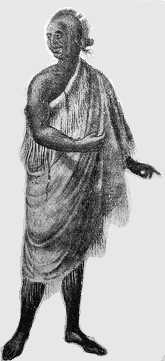Outsiders: black
Othello is called a "Moor," yet his physical description seems to suggest a black man from central Africa, rather than an Arab. (Rodrigo describes Othello as "the thick lips," for example [1.1.63].) Since the mid-sixteenth century, black people had been known in London, and by the time Shakespeare was writing the slave trade had begun.
Ships carrying black slaves passed through London, and many stayed*--even perhaps in the brothels that were so close to the theatres.
Not altogether surprisingly, in an age before tourism, foreigners in general were regarded with a mixture of curiosity and suspicion. To be black was to be doubly foreign, doubly strange. Although there were too few blacks in London for there to be prejudice in the modern sense, the colour black was traditionally associated with many of the things we regard as signs of prejudice: blacks were associated with ugliness, savagery, sin, and lasciviousness.
Indians, Africans and Inuit, at various times were regarded as curiosities, as freaks to be marvelled at (compare the attitude of Stephano to Caliban).
Shakespeare's first black man, Aaron in Titus Andronicus, is close to the stereotype: murderous, sexually avid*, and ruthless. Yet even he is less brutal than those around him. In a remarkably bloody play, one of the more attractive moments is Aaron's affection for his child.
In this context, it is remarkable that Shakespeare should choose to make a black man the protagonist of one of his mature tragedies*: whether Othello is seen as noble, or foolish (or both noble and naïve), the play explores with sympathy the inevitable insecurity of the outsider, admired and feared.
The illustration, from those of Inigo Jones's masques is reproduced from the Devonshire Collection, Chatsworth, by permission of the Trustees of the Chatsworth Settlement.
Footnotes
-
Africans in London
In 1601, two years before the probable date of the writing of Othello, there were so many black people in London that an edict was issued that the "Negars and blackamoors" in the city be deported.
-
Portia and Morocco
Morocco, in The Merchant of Venice, fails to win Portia (through pride), but his claim that he is the same as white people under the skin wins some sympathy ("let us make incision for your love / To prove whose blood is reddest" [2.1.6-7]). Portia, however, is mightily relieved that he chose the gold casket: "Let all of his complexion choose me so" (2.7.79).
-
Aaron's child
Aaron's black baby with the Queen of the Goths, Tamora, echoes the shock experienced by the English a decade before Shakespeare's birth, in the mid 1550s, when a black Guinean married an Englishwoman: their child was of course black.
Anthony Burgess, in his novel Nothing Like the Sun, speculates that the dark woman of Shakespeare's Sonnets was literally a black woman.
